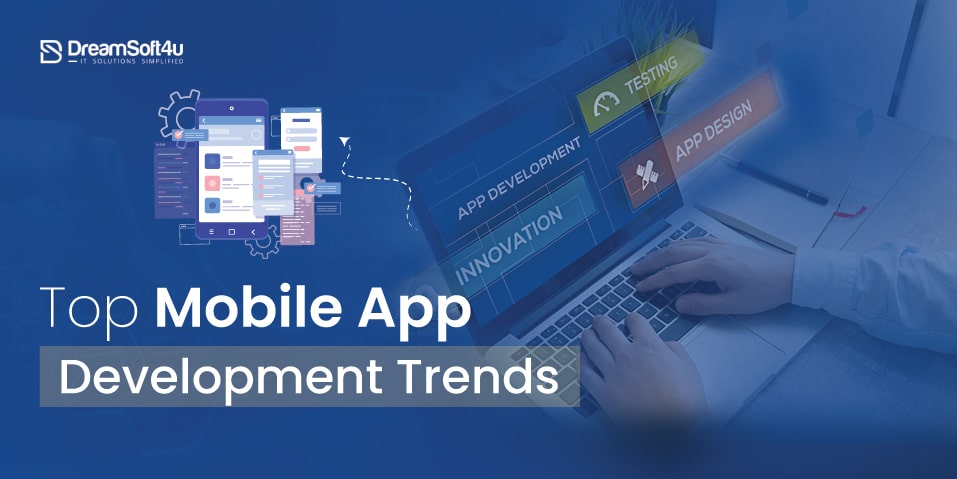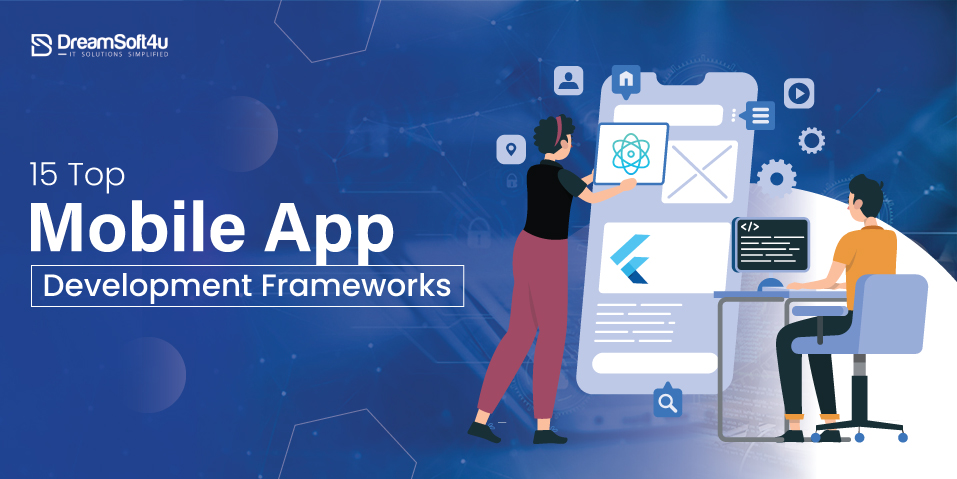Software development has always been a complex and lengthy process. Fortunately, AI is changing the way software is developed. It is taking steps to make it more efficient, innovative and faster. AI in software development helps automate repetitive tasks, improve code quality, and speed development. So that business owners can launch their products timely and stay competitive in the market.
In the competitive world of business, time and efficiency are everything. Recent stats show that 90.9% of companies adopted AI in their software development process to get work done faster.
Despite its vast benefits, many businesses are not aware of the role of AI in software development and how they can get numerous benefits from using AI.
That is why, In this blog, we will understand the role of AI in software development, its benefits, challenges, and the future of AI in software development.
So that you can understand how AI will benefit your business and what steps you need to take to stand out.
Table of Contents
ToggleRole of AI in Software Development
AI in software development is transforming through automation and AI technologies. It now assists computer software engineers in code writing, testing, bug detection, and vulnerability identification.
AI accomplishes this through advanced techniques powered by Machine Learning, Natural Language Processing, and Predictive Analysis. It is altering the business model by fostering innovation and productivity with the following technologies:
- Machine Learning enables an AI to analyze data and gradually become more proficient.
- Natural Language Processing makes it much easier for non-tech people to interact with a machine using simple English.
- Predictive analysis anticipates future obstructions to project workflows and identifies potential bottlenecks or delays. AI analyzes data from previously executed projects.
Big tech companies like Google, Microsoft, and Amazon are already spending a ton of money on AI-powered tools for their development teams. These tools can accelerate their processes, improve their software, and ensure the product meets the user’s needs.
By automating their typical tasks, like bug detection and code suggestions, AI can free developers to focus on the fun, creative, and problem-solving processes.
Key Applications of AI in Software Development

These are some key applications of AI in software development:
Code Generation
AI can now create code from basic human language. Tools like GitHub Copilot can take a statement like “create a login form” and, in seconds, provide a working code. This means your developers are focused on solving business problems instead of repetitively typing code. For business owners, proper use of AI means faster development times, faster product releases, and lower labor costs—giving you a distinct advantage in the market.
Bug Detection and Fixing
Finding and repairing bugs is a large part of software development, and AI is only getting faster and wiser. AI-based tools can analyze your codebase, find potential bugs like logic errors and security holes, and make fixing suggestions right away before they become expensive problems. The result is software that runs better with a lower likelihood of bugs after launch.
Automated Testing
Testing your software ensures it works, but writing and running tests can take time. Automated tests can now be done thanks to AI tools. Automated testing checks that everything works properly, finds problems before they arise, and continues testing as your software changes. The result is faster releases, fewer problems after launch, lower QA costs, and your team can deliver polished products much quicker.
Predictive Analytics
What if there is a tool that tells you where your project might be delayed before it happens? Well, that is not the concept anymore. Now, AI can look at your current and past projects to spot trends and predict where things might go wrong—like delays or resource shortages. It helps your team plan better and avoid surprises. As a business owner, this enables you to manage risks, stay within budget, and deliver results on schedule.
Documentation
When there is software development then clear and updated documentation is essential. It is like a manual for your software. It helps your team understand how things work and makes it easier to add new features down the road. The problem? It is tedious and time-consuming to write. AI can handle that—automatically creating and updating documentation as your code changes. That means your team always has clear, up-to-date info without the extra effort.
Project Management
Managing a software project can feel like juggling a hundred different things simultaneously. AI can help you by monitoring the project to foresee delays early and query what remedy could be used. It helps your team stay organized and can help projects remain on track.
Code Reviews
Code reviews are essential for catching mistakes and improving before the launch of software development. It is a very complex task for developers to reach each line of code and review it in more detail. No worries – AI tools can act like virtual reviewers, automatically checking code for errors, inefficiencies, or security issues. They can also spot inconsistencies in coding style or formatting. More importantly, AI offers suggestions to improve the code. This speeds up the review process and ensures your development team produces secure, scalable, and clean code.
Image Generation
Developers create visuals like UI mockups, icons, and illustrations. This process can be time-consuming and requires a decent sense of design or creativity. Surprisingly, it may be a lot easier with AI. You simply have to tell AI what you need, and it will create it for you–a screen layout gr, graphic element, or even a placeholder image. This saves time and design work, so your app or website can look great without paying a full-time designer.
Benefits of Using AI in Software Development

Here are some significant benefits of using AI in software development services:
Automating Repetitive Tasks
AI can handle repetitive tasks like writing code, testing, or fixing minor errors. Usually, these tasks take longer than you think, but the AI can do them faster and without mistakes. When used for these tasks, AI frees your development to more strategic tasks, ultimately leading to quicker projects with less burden. For your company, less labor costs and faster development.
Improved Code Quality and Reliability
Generative AI tools automatically identify code issues and fix them instead of relying solely on human developers for identification. This promotes more reliable software with fewer bugs and issues after deployment. This means fewer bugs, better running software, and a product customers can rely on. Ultimately, you create a product without typical trouble to assure program quality.
Increased Efficiency and Reduced Time to Market
Time-to-market matters now more than ever. The good news is that AI can speed up software development by automating tasks and suggesting improvements in real time. This means the product is ahead of your competition, and you can make a dollar sooner.
Reduced Development Costs
Automation helps in reducing expenses and AI is an excellent example of this. Tasks such as coding, testing, and bug fixing can now be done through AI, which saves time and energy. AI also spots errors early on and prevents costly last-minute changes or problems after launching the product. These factors enhance overall development costs.
Data-Driven Decision Making
Today, companies primarily rely on data to make follow-on decisions and strategies. Data experts took the lead in analyzing data in the past and then providing valuable and informed insights. Now, AI can analyze a lot of data at once and tell you useful information about customer behavior, trends, and what is working. This information helps you create software to market trends and customer needs. It is like having a business advisor with you.
Enhanced Debugging and Error Detection
The best part of AI is its ability to catch bugs early. For instance, AI tools can anticipate bugs based on experience, highlight bugs in code, and even provide suggestions to correct bugs. Developers spend less time looking for bugs and more time developing new features, which is nice, too. So, issues are caught early before they become too big, leading to a more stable product.
Better Collaboration and Communication
A custom software development company process involves various stages of team efforts, from designers and developers to testers. For successful software development, clear communication is key, especially if your team is working remotely. AI tools help teams work together more efficiently. They offer things like automated notifications, task tracking, and real-time updates. This allows teams to stay on the same page and ensures that work is done efficiently. This leads to smoother project execution and better overall results.
Improving Software Security
With the rise in cyber attacks, businesses seek ways to protect their sensitive information from hackers. AI shines in this area because it can detect potential vulnerabilities before they become problems. AI continuously monitors your software, identifying risks and helping you patch security gaps. It can even suggest improvements to security protocols, ensuring that the software is constantly updated with the latest defense mechanisms.
What are Industry Leading AI Tools in Software Development?
Using powerful tools to get the most out of AI in software development is good. Here are some popular AI tools that can help during software development:
- GitHub Copilot: GitHub Copilot is like an AI assistant for developers. It suggests code as developer type, helping write code faster and with fewer mistakes. It can even generate full functions based on a short comment or instruction.
- DeepCode: DeepCode reviews code using AI and points out issues or bugs. It understands how your code works and gives innovative suggestions to fix problems before they cause trouble.
- ClickUp: ClickUp is a project management tool with built-in AI. It helps plan tasks, manage timelines, and assign work efficiently. The AI features can predict delays and suggest ways to improve team productivity.
- Darktrace: Darktrace uses AI to protect your software from cyber threats. It monitors your system in real-time and quickly responds to unusual or harmful activity, helping keep your data safe.
- IBM Watson: IBM Watson is a robust platform that uses AI to analyze data. It helps you make better decisions during software development by providing insights, trends, and predictions from your data.
What Are the Challenges and Considerations?
Here are some significant challenges of using AI in software development:
1. Data Quality
AI makes decisions based on data and relies on quality data to learn and improve its decision-making. If data is incomplete, out-of-date, inconsistent, or exhibits bias. In that case, AI will produce low-quality outputs, suggest (and may even introduce bugs in your software) flawed code, or make inaccurate predictions. Teams must invest sufficient time gathering, cleaning, and maintaining high-quality, contemporary data applicable or relevant to the situation or environment so that AI works as intended.
2. Ethical Concerns
AI can unintentionally reinforce harmful stereotypes or biases if not carefully monitored. It might make unfair decisions based on race, gender, or other factors if those biases exist in the data it was trained on. Moreover, AI systems often lack transparency—making it difficult to explain how a decision was made, which raises accountability issues. This can be especially problematic in applications that affect people directly, like hiring or lending platforms.
3. Need for Skilled AI Professionals
AI is not a “plug-and-play” technology. To successfully implement AI tools, developers need knowledge across many areas, including machine learning, data science, and natural language processing. They also require soft skills, such as the ability to communicate and collaborate, so that they can transfer AI knowledge across teams. However, not every organization has access to personnel with these skills, and given the pace of change in AI, it is reasonable to have them always committed to learning.
4. Bias and Fairness
Artificial Intelligence learns from data; if that data is biased, the AI can reflect those biases. And as developers of software, you can create systems that discriminate against particular groups of individuals or mistreat your users. For example, an AI model trained on biased hiring data may prefer hiring some users over others. Fairness can be achieved using audits, multimodal data, and ethical design.
5. Data Privacy Concerns
AI systems need much user data, raising serious privacy and confidentiality concerns. For example, if developers mishandle user data or contractors get hold of it, it could be breached and have legal ramifications. Developers must comply with laws about handling data, anonymize data when possible, correctly obtain users’ consent, and honor their right to withdraw consent.
6. Integration Issues
AI tools don’t usually fit right into existing software. There can be compatibility issues, differing data formats, multiple APIs or interfaces, and other obstacles that could delay development. After you’ve taken the AI leap, integration can be complicated and often means structural changes, more testing, and more maintenance to ensure the AI components are appropriately integrated with the rest of the system.
7. Cost and Resources
Building and maintaining AI systems can be expensive. Costs include training models (which need lots of computing power), storing large datasets, licensing advanced tools, and hiring AI specialists. This financial burden can be a significant barrier to adopting large-scale AI technologies for startups and small teams.
8. Scalability and Performance
AI models may work well in testing but struggle under real-world demands. As more users or larger datasets are introduced, performance can drop. Some AI tools are not built to scale easily, which affects response time, accuracy, and efficiency. Teams must plan for scaling early on and invest in infrastructure supporting long-term growth.
Planning to implement AI in the software development process?
We’ve a team of experts who can offer end-to-end software solution
Future of AI in Software Development
AI is quickly changing how we build software; it will only get more competent and helpful. Here is what the future holds:
- Low-Code/No-Code Platforms: Tools like Mendix and OutSystems will let people create apps without writing much code. Even non-developers will be able to build software using simple, AI-powered tools.
- Autonomous Coding: In the future, AI can write and even launch apps with little help. This means faster development and less time spent on repetitive tasks.
- AI + Quantum Computing: When AI teams up with quantum computers, they can solve complex problems much faster. This could significantly improve how software is built, and data is processed.
- Shift in Developer Roles: Developers would not just write code. They will focus more on creative thinking, problem-solving, and guiding AI tools. AI will handle the tedious tasks—developers will take on the big-picture stuff.
Conclusion
Overall, AI is changing the entire game in software development. It helps developers work faster, catch mistakes early, and manage projects better. By automating boring or repetitive tasks, AI gives teams more time to focus on creative and vital work. Those businesses utilizing AI’s potential in software development have a competitive edge. Plus, using AI in software development can cut costs, boost quality, and stay ahead of the competition.
We hope this blog helps you understand the role of AI in software development, its benefits, challenges, and future scope. Now, it is your turn to find an experienced software development services provider and let the team of professionals help you build tailored software using AI to get work done faster and more cost-friendly.
So, if you have decided to build custom software, you should hire a development firm with years of experience and skilled professionals. DreamSoft4U is a leading AI consulting services provider with over 20 years of experience. Our team of developers will work closely with you and provide tailored software for your business needs on-time and affordable. Contact Us today!
FAQs
1. How does AI improve efficiency?
AI helps by doing repetitive tasks faster and with fewer errors. It automates things like testing, bug fixing, and code suggestions. That way, developers can spend more time planning, designing, and building better features. It makes the whole process smoother and quicker.
2. How can AI and ML automate and optimize your software development process?
You can use AI and ML tools to write code, review it, run automated tests, find bugs, and even manage tasks. Tools like GitHub Copilot, DeepCode, or TabNine assist in coding. AI also helps predict delays and manage resources better, so your team works smarter—not harder.
3. What is the use of artificial intelligence in software development?
AI makes development faster and wiser. It can help write clean code, spot bugs early, test software, and generate documentation. It is like having an intelligent assistant that supports developers through the entire development cycle.
4. Which tasks in software development can be automated using AI?
Many routine tasks can be automated. These include:
- Code suggestions and auto-completion
- Bug detection and fixing
- Code reviews
- Test case generation and execution
- Deployment and monitoring
5. Can AI replace human software developers?
Not really. AI is powerful but lacks creativity, critical thinking, and real-world understanding. Developers must still make key decisions, solve complex problems, and create new ideas. AI supports humans—it does not replace them.
6. Is AI suitable for small businesses or startups developing software?
Yes, definitely. AI tools can save time and reduce costs for small teams. Startups can use AI for faster prototyping, automated testing, and innovative coding tools. It helps them build quality software with fewer resources.


















